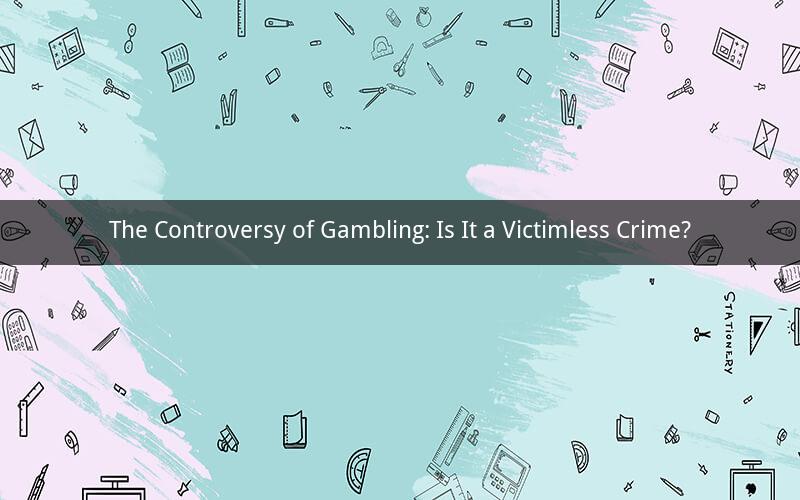
Introduction:
The debate over whether gambling is a victimless crime has been a hot topic for years. While some argue that it is a personal choice and does not harm anyone else, others believe that gambling has severe consequences on individuals, families, and society as a whole. This article delves into the arguments for and against the notion of gambling being a victimless crime, providing a comprehensive analysis of the issue.
Arguments Against Gambling as a Victimless Crime:
1. Financial Loss and Debt:
One of the most significant consequences of gambling is the potential for financial loss. Many individuals, particularly those with gambling addictions, lose substantial amounts of money, leading to debt and financial instability. This not only affects the gamblers themselves but also their families and loved ones who may be burdened with the debt.
2. Mental Health Issues:
Gambling addiction can lead to various mental health problems, such as depression, anxiety, and substance abuse. These issues can have a profound impact on the individual's well-being, relationships, and overall quality of life. Furthermore, the stress of financial problems and the psychological effects of gambling addiction can also affect family members and friends.
3. Crime and Illegal Activities:
Gambling can sometimes lead to illegal activities, such as fraud, theft, and embezzlement. These crimes not only harm the victims but also have a broader impact on society. Moreover, the illegal gambling industry can create a sense of lawlessness and undermine the rule of law.
4. Social Costs:
The social costs of gambling addiction are substantial. It can lead to family breakdowns, broken relationships, and even homelessness. The burden of caring for gambling addicts falls on society, as they may require support from healthcare systems, social services, and law enforcement agencies.
Arguments in Favor of Gambling as a Victimless Crime:
1. Personal Choice:
Proponents of the victimless crime argument assert that gambling is a personal choice, and individuals should be free to engage in it without facing legal repercussions. They argue that as long as the activity is legal and individuals are aware of the risks, it should not be considered a crime.
2. Economic Benefits:
Gambling can generate significant economic benefits for governments, through taxes and fees. These funds can be used to support public services, infrastructure, and social welfare programs. Additionally, the gambling industry creates jobs and contributes to the overall economy.
3. Entertainment Value:
Gambling can be seen as a form of entertainment, similar to other leisure activities such as sports betting or lottery tickets. As long as individuals participate in a responsible manner and do not become addicted, it can be considered a victimless activity.
4. Personal Responsibility:
Advocates for the victimless crime argument emphasize the importance of personal responsibility. They argue that individuals should be accountable for their actions and bear the consequences of their choices, including gambling.
Conclusion:
The debate over whether gambling is a victimless crime is complex and multifaceted. While there are valid arguments on both sides, the negative consequences of gambling addiction and its potential to lead to illegal activities and social problems cannot be ignored. It is crucial to strike a balance between personal freedom and the need to protect individuals and society from the adverse effects of gambling.
Questions and Answers:
1. Question: Can gambling addiction be treated effectively?
Answer: Yes, gambling addiction can be treated effectively through various methods, including therapy, counseling, and support groups. However, it is a challenging condition, and recovery may require time and effort.
2. Question: How can governments regulate the gambling industry to minimize its negative impacts?
Answer: Governments can regulate the gambling industry by implementing strict licensing requirements, age restrictions, and responsible gambling measures. They can also provide resources for individuals struggling with gambling addiction and promote education about the risks associated with gambling.
3. Question: Is online gambling more dangerous than traditional gambling?
Answer: Online gambling can be more dangerous due to its accessibility and potential for anonymity. This can make it easier for individuals to develop gambling addictions and engage in illegal activities. However, both online and traditional gambling carry risks, and responsible gambling practices should be applied to both.
4. Question: Can gambling be a source of financial stability for individuals?
Answer: While it is possible for individuals to win money through gambling, relying on it as a source of financial stability is generally not advisable. The odds of winning are often stacked against the gambler, and the potential for addiction and financial loss is significant.
5. Question: How can families support loved ones struggling with gambling addiction?
Answer: Families can support loved ones with gambling addiction by offering empathy, understanding, and encouragement. They can also help their loved ones seek professional help, create a supportive environment, and educate themselves about the condition to better understand and support their family member's journey to recovery.